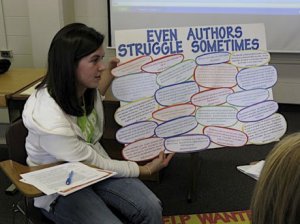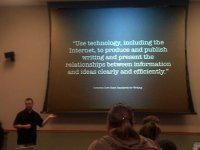Engaging Pre-Service Teachers in Authentic Writing Instruction
As a writer, I know firsthand how important it is for me to share what I've written and receive feedback on my work. And as a teacher of writing -- from my initial experience in the middle school classroom up to my current work as a teacher educator at Central Michigan University and director of our Chippewa River Writing Project -- I want my students to experience this, too. It is with this understanding in mind that I teach my methods course, ENG 315: Writing in the Elementary and Middle School.
My Teaching Context
Unfortunately, I know that many of my pre-service teachers come to my course with a jaded view of writing. If high school hadn't already taken a passion for writing out of them, four years of college certainly have. Thus, I must teach my preservice teachers how to re-envision themselves as writers and, consequently, as teachers of writing.
Many of them have "played the game of school" quite well, and they want to be given very detailed assignments with specific rubrics in order to know that they are meeting the goals. Yet writing is messy, recursive, and should be challenging in an authentically intellectual and emotional way. School (as they have typically experienced it) doesn't usually teach writing in such a manner -- but I do. Thus, we explore a variety of genres and publish work with numerous digital writing tools, three of which I will elaborate on here, with links to further descriptions of the assignments.
This I Believe
Employing the same writing strategies as the essay series for which this assignment is named, one piece of personal writing they compose is a This I Believe essay. We discover the components of a good essay by analyzing three essays of their choice, and then I remind them that "to essay," as a verb, means to make an attempt, to test, to try and to practice. Since they are so accustomed to writing essays that have so many requirements, these less stringent guidelines are actually more difficult for them to grasp. I have to encourage them to take a risk with their writing. Finally, after they have shared their work in peer response groups, they record the final product as a podcast using a tool such as Soundcloud. Here is an example from Megan, who wrote about the value of sports in her life.
Digital Storytelling
After this, they create a digital story. With the idea that they will combine narration, photos, music and other video effects to create a coherent, thoughtful digital story, I ask students to take one of their prior pieces of writing and revise it into a script. I also encourage students to look through their digital photo albums and decide what stories they might want to tell. This is not just about a great vacation or a particular set of friends. Instead, they need to think carefully about developing characters, advancing a plot, and having an overall theme. For instance, Jodi wrote about her experiences with the Alternative Breaks program over the course of her college career, using dozens of digital images that she’d collected and turning them into a compelling digital story.
Multi-Genre Research Project
Finally, as the culminating experience, I ask students to prepare a multi-genre research project focused on a topic related to teaching of writing. There are two main goals for this assignment. First, I want my pre-service teachers to delve deeper into a topic of personal interest that relates to the teaching of writing. Second, I want them to explore the topic in a manner that will be professionally useful beyond ENG 315. They utilize multiple genres including a classroom newsletter, mini-lessons, handouts for students and additional genres of their choice. The topics that they choose are varied, as are the ways in which they present those topics through various genres. Occasionally, I hear back from my students via email or if I meet them at a professional conference, and they often tell me how the multi-genre research project was the most useful assignment from any of their methods classes.

The Benefits of a Writerly Life
In the end, I know that these approaches work for the majority of my students and help them rethink what it means to be both a writer and teacher of writing. Perhaps the most lasting testament to my work as a teacher educator is one of the most recent. This past summer, I was able to co-author an article about digital storytelling with a fellow English educator Kristen Turner and, more importantly, one of my pre-service teachers, Jodi Stratton, whose digital story is mentioned above. Near the end of the article, Jodi reflects on her growth during the course: "As a writer, I have been able to see my process of writing and how I can use my words to create a powerful message."
My goal as a teacher educator, and my sincere hope as a writer myself, is that Jodi and all of my pre-service teachers will now be able to bring their reinvigorated passion for writing back to their own students. Therefore, I work diligently to help my pre-service teachers live a writerly life, at least for 15 weeks, in hopes that they will carry a sense of curiosity, inquiry and genuine respect for young writers back into their own teaching practice.
What assignments do you give your pre-service teachers to shape their writing and thinking?
